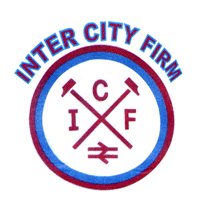On 11 November the Trade Mark Registry refused registration of the following mark:

The mark was applied for by a company called Sporting Kicks Ltd to cover among other things clothing, footwear, headgear and badges.
The sign featured the words "Inter City Firm", a crossed hammers device similar to that of West Ham Football Club and the Intercity logo of the former rail operator British Rail.
The Inter City Firm was an infamous gang of football hooligans in the 1980s who travelled to matches by Intercity rail and were notorious for their violent and vicious behaviour.
The Registry refused registration of the mark on the basis of Section 3(3) of the Trade Marks Act 1994 which provides that a mark shall not be registered if it is "contrary to public policy or to accepted principles of morality".
The mark was seen as a form of "anti social branding" potentially threatening to others and likely to cause alarm or distress. It was thought likely to cause an increase in football violence by individuals or gangs. A football fan of a rival club could easily be goaded or provoked into violence. In this sense it was a "badge of antagonism".
In considering the public policy objection the Registry had regard to Article 6 quinquies of the Paris Convention of 1883 and the French concept of "ordre public", i.e. the prevention of disorder. It also had regard to the Public Order Act 1986 which makes it an offence to display "any writing, sign or other visible representation which is threatening, abusive or insulting within the … sight of a person likely to be caused harassment, alarm or distress thereby".
Refusal of registration was also held to be consistent with freedom of expression (including commercial expression) principles of the European Convention on Human Rights which is subject to the interests of public safety and the prevention of disorder or crime.
The applicant argued unsuccessfully that the football violence associated with the Inter City Firm died out long ago and that the mark had evolved into a retro style fashion symbol. The Registry was of the view that the association with gang violence lived on.
The applicant also argued that the mark applied for was considerably less offensive than other marks for which registration had been granted. This argument was resoundingly rejected. Quoting from Jacob J (as he was then) in British Sugar plc (1996) RPC 281 the Registry held that comparison with other marks currently on the register is irrelevant.
The content of this article is intended to provide a general guide to the subject matter. Specialist advice should be sought about your specific circumstances.
